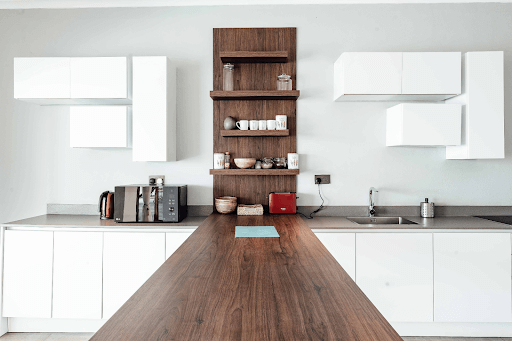Plywood is a robust, versatile sheet material created by gluing thin layers of wood veneer together, with each layer’s grain rotated up to 90 degrees for enhanced strength. In this article, we will examine the various types of plywood, an essential product in plywood production in bulk. Knowing the types of plywood is crucial for any woodworking project. The correct choice of plywood can dramatically impact your creations’ longevity, functionality, and aesthetics.
This comprehensive guide focuses on providing an in-depth understanding of the different types of plywood, ensuring you make informed decisions in your woodworking project.
Types of Plywood
Each type of plywood serves different uses and possesses unique features that make it suitable for various applications. Let’s delve into each of these types.
Hardwood Plywood
The distinguishing factor of hardwood plywood is the use of hardwood, often hailing from deciduous trees such as oak, maple, or walnut. This quality material brings a rich, organic aesthetic to any project and possesses a robustness that makes it suitable for a variety of applications:
High-End Furniture: Hardwood plywood, with its superior finish and distinctively attractive grain patterns, is often the first choice for artisans crafting luxury furniture pieces. Its toughness ensures the longevity of these pieces, while the attractive surface requires minimal decoration.
Flooring: Known for its substantial strength and resistance to wear, hardwood plywood can withstand foot traffic and occasional mishaps that occur in both commercial and residential settings. This is why it’s often found beneath our feet, serving as reliable flooring.
Cabinets and Countertops: When crafting kitchen cabinets and countertops, few materials match hardwood plywood’s durability and visual appeal. Its resistance to moisture and scratches ensures the longevity of the kitchen fittings.
In choosing hardwood plywood, craftsmen are investing in strength, durability, and timeless aesthetic appeal that suits a variety of premium woodworking projects.
Softwood Plywood
Softwood plywood, primarily sourced from coniferous trees like pine, spruce, or cedar, offers its unique set of advantages, including a more delicate texture and lighter weight than its hardwood counterpart:
Construction: Its impressive strength-to-weight ratio allows softwood plywood to form the structural backbone of homes and sheds without adding excessive weight.
Sheathing: Softwood plywood is often utilized as sheathing material due to its ability to add a protective layer to walls and roofs. Its structural attributes aid in boosting thermal insulation and weather resistance of structures.
Making Furniture: While its aesthetic appeal may be understated, softwood plywood’s lightweight nature and ease of handling make it ideal for crafting simplistic yet functional furniture pieces.
Despite its simplicity, softwood plywood brings strength and affordability to the table, making it an appealing choice for construction and manufacturing. This affordability and simplicity also make softwood plywood a popular choice among DIY hobbyists for their projects. From creating garden sheds to building bookshelves, softwood plywood allows DIY enthusiasts to craft durable pieces without breaking the bank.
Tropical Plywood
Tropical plywood, a product of various tropical wood species, stands out for its superior quality and exceptionally smooth surface. It has carved out a niche for itself in certain applications:
Construction: Recognized for its exceptional strength and durability, tropical plywood is a trusted material for many construction projects. Its resistance to warping under changing weather conditions gives it an edge in tropical climates.
Boat-Building: Owing to its high resistance to water damage and rot, it’s a preferred choice for boat building. Its strength and durability ensure that structures can withstand the rigors of aquatic environments.
Furniture: With its fine grain and smooth surface, tropical plywood provides an excellent canvas for fine furniture and cabinet-making, adding a touch of the tropics to the interior space.
The quality and longevity of tropical plywood justify the slightly higher cost, particularly for professionals who prioritize these factors.
Aircraft Plywood
Aircraft plywood, typically engineered from mahogany and/or birch and bonded with heat- and humidity-resistant adhesives, is highly sought after in fields requiring strength and lightweight properties:
Airplane Construction: Its high strength-to-weight ratio and resistance to heat and humidity make aircraft plywood a reliable choice for airplane components.
Musical Instruments: Instruments like guitar bodies demand a blend of strength, stability, and acoustic properties, all of which aircraft plywood readily provides.
Model-Making: For enthusiasts creating detailed models, this plywood’s fine grain and excellent machining properties are invaluable.
Even though it comes with a higher price tag, the superior durability and specific benefits of aircraft plywood make it an optimal investment for specialized applications.
Decorative Plywood (Overlaid Plywood)
As the name suggests, decorative or overlaid plywood is adorned with a veneer layer that provides aesthetic appeal, making it perfect for interior applications:
Wall Paneling: The decorative veneer gives walls an appealing touch, contributing to a refined and homely ambiance.
Furniture: Its beauty and variety allow for an extensive range of furniture designs, adding elegance to any piece.
Cabinets and Shelves: The veneer finish adds a touch of class to cabinets and shelves, while the durability of the plywood base ensures longevity.
While it may not be as robust as other types, the aesthetic appeal of decorative plywood makes it a beloved choice for interior designers.
Flexible Plywood
Also known as bendy plywood, this type of plywood can be manipulated to form curved surfaces without sacrificing its durability. This unique property makes it suitable for:
Furniture Design: Its flexibility allows artisans to break from conventional design constraints and venture into crafting curvy furniture like chairs and tables.
Interior Decoration: In interior design, flexible plywood can be used to create innovative curved surfaces and decorative patterns.
Store Fixtures: Retailers can leverage its properties to design unique, eye-catching display units that enhance the shopper’s experience.
The bending ability of flexible plywood makes it an extraordinary resource for creative designers, offering new dimensions in woodworking.
Marine Plywood
Understanding the types of plywood can make a big difference in your project outcome. Marine plywood, for instance, is treated to resist water and humidity, making it an excellent choice for:
Boat-Building: Its strong resistance to water, even under prolonged exposure, makes it ideal for crafting robust and durable boats.
Dock-Building: Its water-resistant properties make it a perfect choice for building docks, jetties, and other maritime structures.
Bathrooms and Kitchens: Marine plywood’s resistance to humidity makes it suitable for crafting bathroom and kitchen furniture, where it can resist water splashes and steam.
Marine plywood is often the first choice when the project environment calls for a high degree of water resistance. If you’re unsure what plywood type to choose, refer to our Plywood Buying Guide for more information. After purchasing your plywood, check our Plywood Maintenance article for the best practices in maintaining your plywood’s condition.
Structural Plywood
Structural plywood, known for its strength and stability, serves a crucial role in the following applications:
Sheathing in Walls, Flooring, and Roof Decking: Its superior strength and rigidity make it a reliable choice for sheathing material, providing the necessary support and resistance against wind and other external forces.
Making Formwork for Concrete: Structural plywood can withstand wet concrete’s heavy loads and pressures, making it widely used in formworks for concrete structures.
Outdoor Furniture: Its resistance to harsh weather conditions and load-bearing capacity make it a fitting choice for crafting durable outdoor furniture.
Structural plywood’s robust nature makes it ideal for construction and other heavy-duty applications, promising longevity and reliability.
Other Special Plywood
Specialized types of plywood include Fire-retardant plywood, Moisture-resistant plywood, and Pressure-treated plywood, each with unique features catering to specific requirements.
Fire-Retardant Plywood
Fire-retardant plywood is treated with fire-resistant chemicals to enhance its safety features, making it a critical material in:
Public Buildings: In places with high human traffic where fire safety is a top priority, fire-retardant plywood is a common sight, offering an added layer of protection.
Partition Walls: It’s also an ideal choice for partition walls, providing a defensive barrier against fire.
Ceilings: When installed in ceilings, fire-retardant plywood can help to prevent the vertical spread of fire.
Fire-retardant plywood stands as a symbol of safety and assurance when safety comes first.
Moisture-Resistant Plywood
Moisture-resistant plywood is treated to withstand humid conditions, making it a reliable choice for:
Kitchen Cabinets: Given the potential for moisture exposure in kitchens, this plywood ensures that cabinets retain their form and function over time.
Bathroom Furniture: It’s an excellent choice for bathroom furniture, capable of withstanding the high humidity typical of these areas.
Basements: As basements often face moisture problems, moisture-resistant plywood is a popular material for basement constructions and renovations.
Whether you’re remodeling a bathroom, kitchen, or basement, moisture-resistant plywood is an investment in longevity and durability.
Pressure-Treated Plywood
Pressure-treated plywood, treated with preservatives to resist decay and insects, is mainly used for:
Outdoor Projects: Its resistance to decay makes it perfect for outdoor projects.
Garden Furniture: It’s an ideal material for crafting long-lasting garden furniture.
Decks and Fences: Its robustness and durability make it suitable for building decks and fences.
Pressure-treated plywood provides a long-lasting solution for outdoor woodworking projects.
Plywood Grades
When choosing plywood for your project, it’s essential to understand plywood grades, which refer to the quality and appearance of the plywood’s face and back veneers. Plywood grades range from A, the highest quality with no knots and blemishes, to D, the lowest grade with knots and splits.
Plywood Sizes
The size of plywood sheets can impact your project’s success. Most plywood sheets come in standard sizes, the most common being 4 x 8 feet. However, other sizes are available, depending on your project’s needs.
When choosing plywood for your project, understanding the different types, their applications, and their unique features can lead to a successful project outcome. Understanding the importance of plywood grades and sizes is essential to make an informed choice.
The Best Plywood Type for Your Project
Navigating the realm of plywood can seem overwhelming, but armed with the knowledge provided in this guide, you’re well-equipped to make an informed decision tailored to your project’s specific needs. As an industry leader, Keller Products offers a vast selection of quality molded plywood, with custom solutions available to bring your unique visions to life.
Remember, your project’s success hinges on selecting the right plywood type, and we are here to help. To explore our range of products and services, or to bring your custom concept to reality, contact us today!

